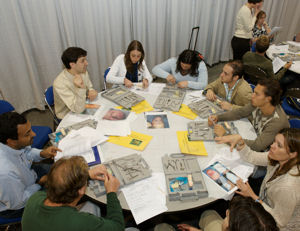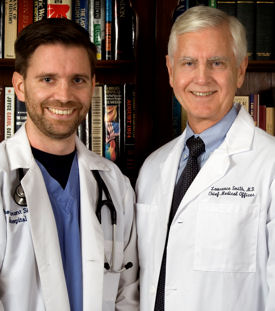Hands-on learning is the new Clinical Skills Center's mission
New sights and sounds will greet visitors to the Herbert S. Waxman Clinical Skills Center.
New sights and sounds will greet visitors to the Herbert S. Waxman Clinical Skills Center—formerly the Learning Center—at Internal Medicine 2008.
Last year's self-guided audio tour of heart murmurs has been expanded to include more murmurs, as well as other heart sounds. Participants can listen to the sounds on an MP3 player and walk through a series of posters that will give a visual representation of each sound, as well as show how to place a stethoscope where the sound can be heard best. Short pre- and post-tests will offer feedback on listening skills.

“We know from research that when you hear a heart murmur 400 times, you are much more likely to make the diagnosis correctly when tested later,” said Patrick Alguire, FACP, Director of Education and Career Development for ACP. “A murmur is less than a second long, and the program has 400 repetitions per sound, so it really doesn't take long, and people walk away with a sense of having mastered something.”
A brand-new workshop, “Neurological Evaluation of the Comatose Patient,” will allow attendees to examine simulated comatose patients for physical characteristics that suggest various diagnoses. Participants will also provide differential diagnoses based on written scenarios, as well as summary diagnoses and treatment plans. An expert neurologist will offer feedback, and teach a brief session on how to diagnose and manage comatose patients in the emergency department and hospital.
Last year's very popular session on central venous line placement will return, but with availability on Thursday, Friday, and Saturday instead of just one day. The course teaches physicians to place a vascular access line in a major vessel in the neck using a series of three stations and with the aid of models and hand-held sonogram machines.
Other old favorites will return as well, including the skin biopsy, suturing and arthrocentesis workshops; the toenail removal station; and “Harvey,” the life-sized patient simulator that helps participants improve their cardiac diagnostic skills. Medical students will again be able to participate in the Clinical Skills Practice Examination, to help sharpen skills for their licensing exam.
The Clinical Skills Center is open from 10 a.m. to 5 p.m. on Thursday, and from 8 a.m. to 5 p.m. on Friday and Saturday.
More clinical skills activities
Other new activities are available at IM 2008 which, while not physically located in the Clinical Skills Center, are nonetheless part of the clinical skills program.
One new session entitled “Can We Talk?” will explore the common reasons behind interpersonal conflict in the medical setting, and teach practical strategies to address these conflicts. Another will teach patient-centered methods of discussing the initiation of insulin therapy, including an understanding of common patient concerns and ways to address them. The session will also have participants practice insulin injection techniques and the use of blood glucose monitoring data to make insulin adjustments.
Additional new skills workshops will focus on:
- using ultrasound for thoracentesis and paracentesis,
- assessing and examining adults with autism,
- explaining and demonstrating inhalers and oxygen delivery devices to patients, and
- screening for hearing loss and recognition of common hearing aid problems.




